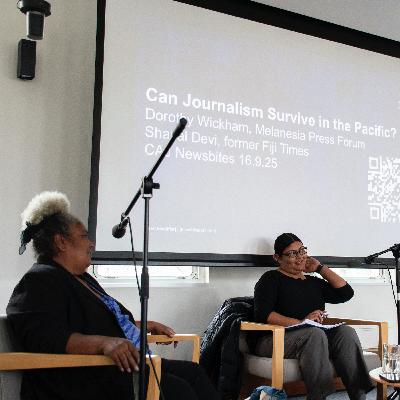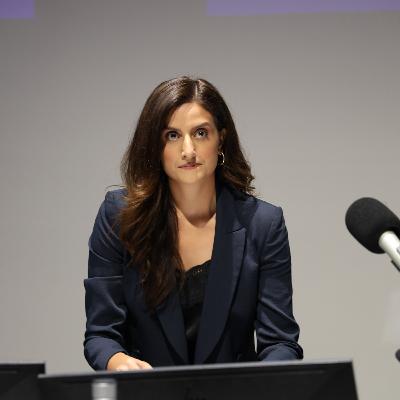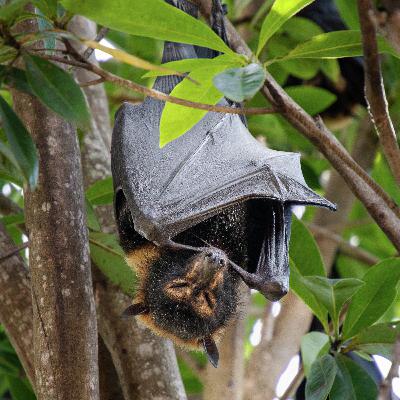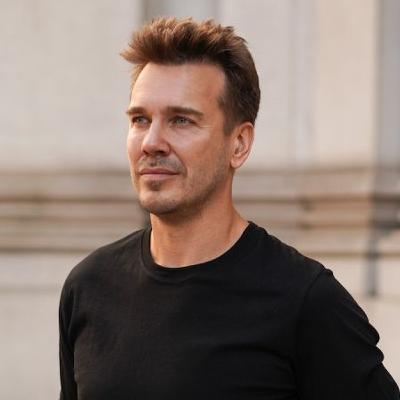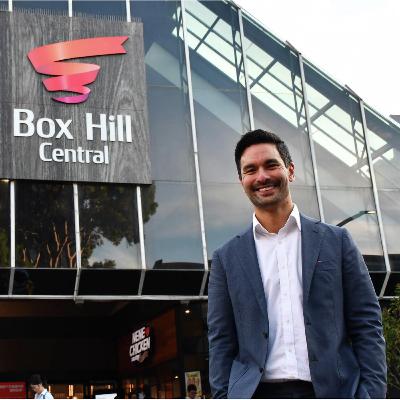Discover The Yarn
The Yarn

The Yarn
Author: Centre for Advancing Journalism
Subscribed: 1Played: 4Subscribe
Share
Description
The Yarn is a podcast showcasing work from The Centre for Advancing Journalism at the University of Melbourne. It features original reporting by students, content from The Citizen publication, as well as talks and events held by the Centre.
127 Episodes
Reverse
Over the past month, we’ve heard from The Citizen’s reporters about their interviews with the residents of Chisholm in the lead up to the election.
In 2019, the electorate was one of the most marginal seats in the entire country but things were a little different this time around.
In our fourth and final episode, we’ll hear some post-election analysis from reporter Petra Stock and reflect on what it means for Chisholm to have both a new Prime Minister and a new MP.
See omnystudio.com/listener for privacy information.
Today, we’re sharing a talk from Pulitzer Prize-winning war journalist Chris Hedges, who believes the Western media is complicit in the Gaza genocide. Chris spent two decades covering war zones in places like Iraq, Sarajevo, and Gaza. He’s also the author of more than a dozen books. His most recent is A Genocide Foretold: Reporting on Survival and Resistance in Occupied Palestine. In front of a live audience at the University of Melbourne, he discussed his wide-ranging career, the history of Israeli violence, and how the media manufactures consent for atrocities. Show Notes: The Chris Hedges Report on Substack See omnystudio.com/listener for privacy information.
The Labubu craze might be baffling to some, but their relentless popularity has led to a thriving black market for counterfeits, or “Lafufus”. This week on The Yarn, reporter Ashleigh Wyss explains how these low-quality fakes could be putting kids in danger. Her investigation on this issue was copublished by The Citizen and CHOICE. Show Notes Ashleigh's investigation for CHOICESee omnystudio.com/listener for privacy information.
From bread tag collecting to rocket building, the first episode of The Yarn’s Passion Project series delves into the world of immersive hobbies. Across five stories, our reporters investigate interests that blur the line between leisure and purpose, and question why women are treated differently in certain fan communities. This episode features work by Jamille Jayoma, Shaid Sasalu, Aditi Acharla, Jalina Cameron, and Paris Nagorcka.See omnystudio.com/listener for privacy information.
Pacific newsrooms are in crisis. US funding cuts, the rise of artificial intelligence, and constraints on press freedom are just some of the threats to the region’s journalists. On this week's episode of News Bites, Louisa Lim discusses the future of Pacific media with Solomon Islands journalist Dorothy Wickham and Fijian journalist Shayal Devi.See omnystudio.com/listener for privacy information.
Who gets to shape the story? That’s what journalist Nour Haydar has been asking in relation to Australian coverage of Israel’s bombardment of Gaza. On this week’s episode of The Yarn, we’re sharing her AN Smith lecture from December 2024. It’s a searing critique of the Australian media’s double standards, and its failure to “meet the moment”. Since then, the Gaza health ministry says the death toll of Israel’s campaign has risen to at least 68,000, and a United Nations commission of inquiry has classified it as a genocide. See omnystudio.com/listener for privacy information.
First, Artificial Intelligence took our jobs. Now, it's deciding how we're recruited into the ones that are left. For today's episode, Sarah Jensz discusses her reporting on this new—and barely regulated—industry practice. She also speaks with legal experts, including Human Rights Commissioner Lorraine Finlay, who is pushing for urgent reforms to curb algorithmic discrimination. Show Notes: Sarah's reporting for The CitizenSee omnystudio.com/listener for privacy information.
Thousands of Little Penguins nest along the southwest coast of Victoria, but their colonies are constantly threatened by energy companies pushing to conduct seismic surveys. Fearing these shockwaves could devastate local marine life, citizen scientist Carli Reeve rallied her community to protect them. Her grassroots campaign ultimately forced the plans to be scrapped, if only for now. Our reporter Theoné van der Merwe broke this story for Crikey and The Citizen, and in today's episode, The Yarn spoke to her about how this small coastal community took on a multinational energy company - and won. Show Notes: Theoné's reporting for The Citizen Theoné's reporting for Crikey See omnystudio.com/listener for privacy information.
Nature is like a time capsule. The cyclical rhythm of healthy ecosystems can outlast entire civilisations. This week on The Yarn, two environmental stories take us back to postwar Germany and prehistoric Australia. We hear how fragile ecosystems have stood the test of time — and what’s at stake if we lose them forever. These audio documentaries were originally produced by Thomas Phillips for Short Cuts, a Falling Tree production for BBC Radio 4. Follow the link below to hear more Short Cuts stories. Show Notes Short Cuts on Apple PodcastsSee omnystudio.com/listener for privacy information.
In the final episode of Distraction, we explore how a well‑timed distraction, often thought of as a mindless time sink, can become tools for mindfulness, connection, and creativity. Featuring stories by Guilia Scenna, Ying Wan, and Georgie Preston.See omnystudio.com/listener for privacy information.
Whether powered by pixels or pure imagination, gaming offers players a way to forget the outside world. But when the stakes become real, is it really just a game? This week on The Yarn, we’re bringing you stories about the comforts and consequences of gaming, how it helps some players cope, and how it can leave others more drained than when they logged in. Featuring stories by Dylan Claringbold, Olivia Tan, and Bobbi Hewitt.See omnystudio.com/listener for privacy information.
For the third episode of Distraction, we explore the psychological benefits of hobbies — and investigate whether leisure time is divided equally. Featuring stories produced by Elliot Rodriguez, Molly Frew, James Worsfold, and Sarah Jensz. See omnystudio.com/listener for privacy information.
They say that if something is free online, then you’re the product. So are we controlling technology, or is it controlling us? This week on The Yarn, we’re bringing you stories from both sides of the spectrum. From the dangers of social media addiction, to harnessing technology as a tool for good. Featuring stories by Brandon Kearns, Ellen Cutler, Yuqi Zhao, and Yang Li.See omnystudio.com/listener for privacy information.
The first episode of our Distraction series is about wayward attention and the struggle to focus. This week, our producers navigate ADHD, limit screentime, and question whether the solution to distracting technology can come from technology itself. This series was made in collaboration with the Science Gallery for their new exhibition, which is open now. Today's stories were produced by Ricky Sproule, Shixin Wang, Yeting Gao, and Samuel Irvine.See omnystudio.com/listener for privacy information.
Exiled Russian journalist Mikhail Zygar says the Russia-Ukraine war is far from over. He believes Vladimir Putin is prolonging the conflict to fuel propaganda and silence critics. This week on The Yarn, we’re sharing Zygar’s 2025 AN Smith Lecture—Journalism Against Autocracy. Addressing a sold-out audience at Melbourne University, Zygar recounts covering Putin’s Russia for more than two decades. He also discusses attacks on press freedom, coming out as gay in a deeply homophobic society, and why his new home in the United States is giving him “déjà vu”. See omnystudio.com/listener for privacy information.
Who do you think of when you think of an Australian pioneer? Maybe Fanny Finch, the first woman to vote in Australia, who was also a woman of colour. Or perhaps Rosaleen Norton, also known as the Witch of King's Cross. These are the trailblazers whose stories Dr Corey Martin is telling in her podcast, Maiden Australia. In this episode of News Bites, she discusses feminist approaches to storytelling and how podcasting can amplify marginalised voices. Show Notes Maiden AustraliaSee omnystudio.com/listener for privacy information.
It’s been called “a win for the ages”. Anthony Albanese is Australia’s first prime minster to win consecutive terms in more than two decades. His landslide victory has left the Coalition reeling, especially in major cities like Melbourne. For the final episode of Voters’ Voices, we’re focusing on Melbourne’s swing towards Labor. We’re also revisiting the key themes of this series — marginal electorates, the youth vote, and civic disillusionment. Featuring reporting by Ashleigh Wyss, Preeshita Shah, Eva Sementino, and Morgan Reinwald.See omnystudio.com/listener for privacy information.
Ahead of Australia's federal election on May 3rd, we’re bringing you another episode of Voters’ Voices. This week we're focusing on Marginal Melbourne — the city’s most tightly-contested electorates. Our reporters investigated the seats on a knife’s-edge this year and the hot-button issues that could decide their futures. Featuring pieces by Ruby Perryman, Daniel Gawne, Ashleigh Wyss, and August Mikleus. See omnystudio.com/listener for privacy information.
Last week, we focused on young, disaffected voters ahead of the federal election on May 3rd. For episode two of Voter’s Voices, our reporters zoomed out. They went to a broader mix of voters, from retirees to small business owners. They found values were front of mind this year – like political honesty and social and environmental concerns. Featuring reporting by Maxine Ford, Morgan Reinwald, Kai-wern Koo, Daniel Gawne, and Nicole Wang.See omnystudio.com/listener for privacy information.
Ahead of Australia's federal election on May 3rd, we're launching a new series — Voters’ Voices. Episode one is all about what young voters really care about. Gen Z and millennial voters will outnumber baby boomers for the first time this year. It’s being called a cost-of-living election and our reporters investigated whether that’s true.They learned that young Australians feel poor, alienated, and not represented by major parties.See omnystudio.com/listener for privacy information.





